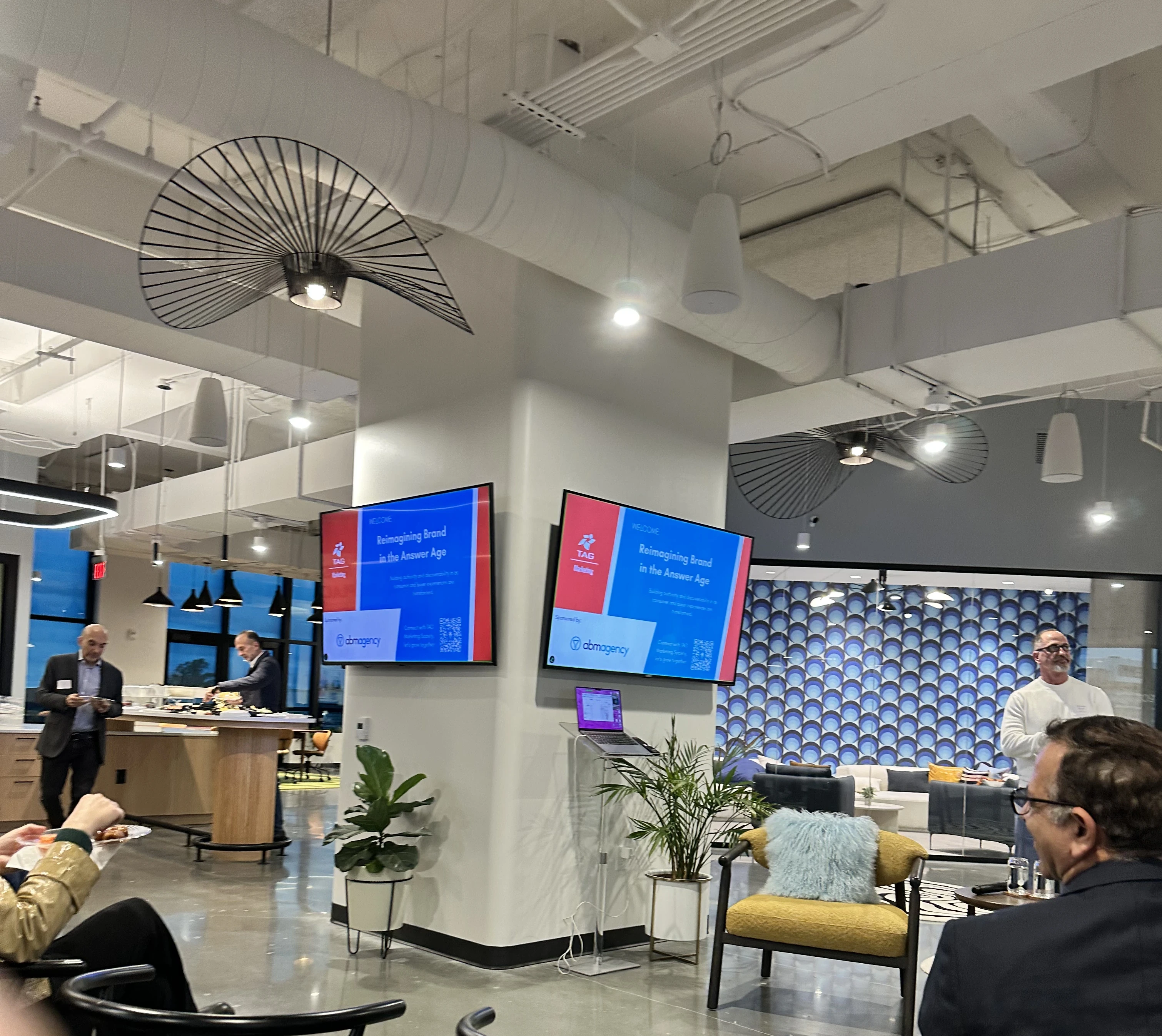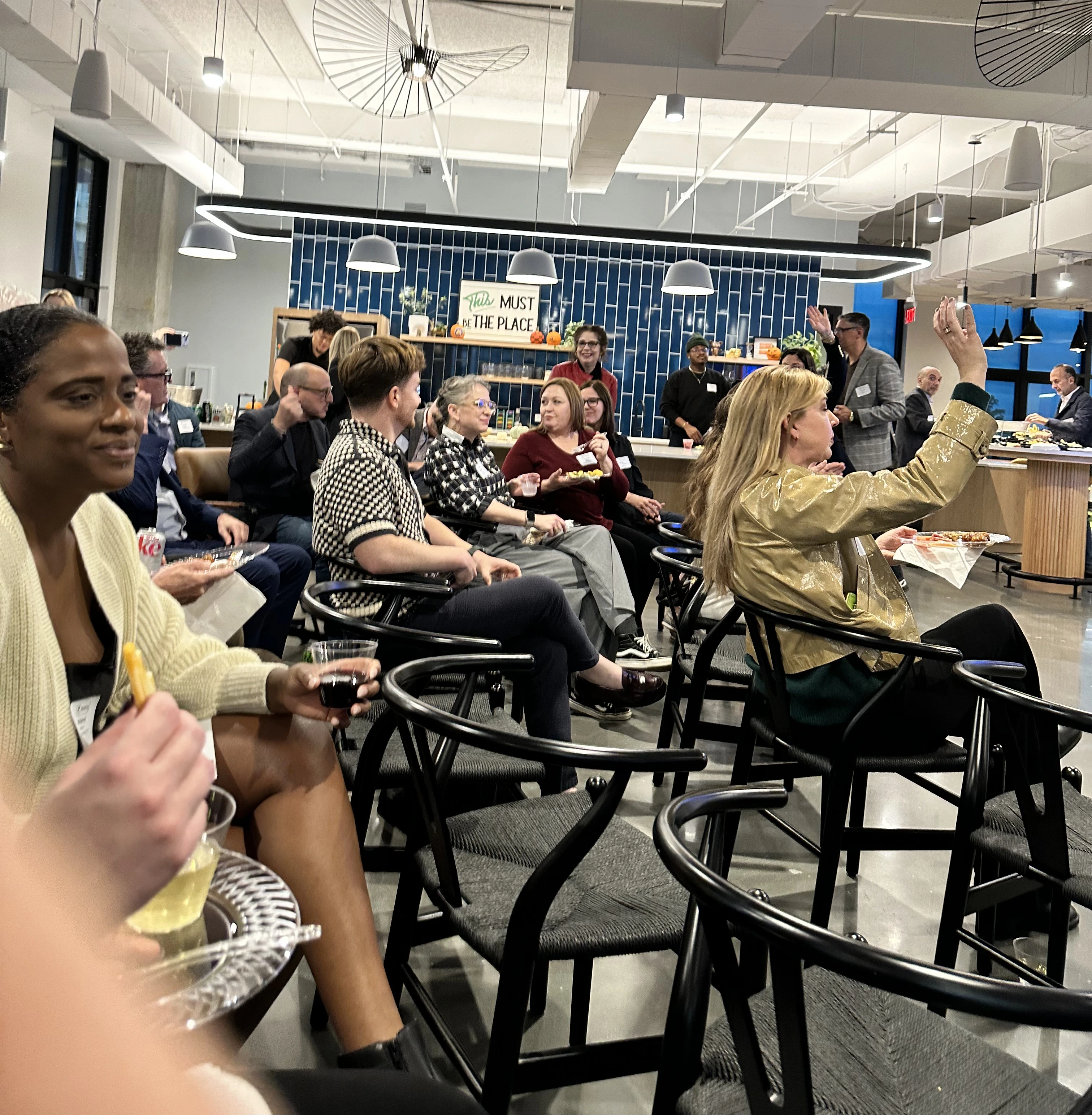TAG Recap: Reimagining Brand Authority in the Answer Age

At the TAG Marketing Society’s October 30th event, “Reimagining Brand Authority in the Answer Age,” held at Alloy Marketing's space in Atlanta’s Interlock building, marketing leaders and technologists explored one of the most pressing questions facing brands today:
How do you stay visible, credible, and trusted when consumers get their answers from AI before ever reaching your website?
Hosted by the TAG (Technology Association of Georgia) Marketing Society, the event unpacked the challenges and opportunities marketers face as generative AI, zero-click searches, and large language models (LLMs) redefine how visibility and authority are earned online.

Welcome to the “Answer Age”
As TAG framed it:
“Consumers are getting answers faster than ever, but fewer of those answers lead back to your website. Welcome to the ‘answer age,’ where generative AI, zero-click searches, and shifting data access are rewriting the rules of digital marketing.”
Panelists agreed that visibility is no longer measured by clicks — it’s measured by credibility.
As AI engines like ChatGPT, Gemini, and Perplexity increasingly act as intermediaries between brands and audiences, marketers must now optimize not just for algorithms, but for AI comprehension and brand trust.
The Panel: Industry Leaders at the Intersection of AI and Marketing
The discussion featured a powerhouse lineup of marketing and digital strategy leaders:
Vincent Decastro, President, The ABM Agency
David Jacobson, Global Sr. Director, Segmentation & Culture Insights, The Coca-Cola Company
Jeff Reine, Partner, Everything Machines
Ron Surfield, Chief Digital Officer, Nasdaq
Together, they explored how AI is disrupting traditional marketing structures — and how leading brands can adapt their ecosystems to thrive in a world where answers come before clicks.
From SEO to AEO: Optimizing for the Machines That Read Us
A central theme was the shift from Search Engine Optimization (SEO) to Answer Engine Optimization (AEO) — a reflection of how AI is now reading, interpreting, and summarizing brand content.
Jeff Reine of Everything Machines put it simply:
“If your content isn’t readable by LLMs, it’s invisible.”
Reine and Decastro emphasized the need for brands to treat AI engines as new audiences — optimizing for structure, clarity, and authority through clean metadata, schema markup, and consistent knowledge signals.
The takeaway: Your brand must communicate fluently with both humans and machines.
Brand Relevance, Credibility, and the AI Bias Problem
David Jacobson of The Coca-Cola Company shared how AI is helping uncover cultural insights and audience sentiment at scale — but he also cautioned that AI’s growing influence comes with bias.
“If your brand doesn’t stand for something, the engines won’t know how to represent you,” Jacobson explained.
“AI is biasing toward authority — and it’s up to us to ensure we’re the authority it finds.”
The point resonated deeply: in the answer age, brand meaning and credibility determine whether your content appears in the conversation at all.
Synthetic Personas and Smarter Market Research
Jacobson also discussed Coca-Cola’s experimentation with synthetic personas and synthetic data — AI-generated models that simulate audience behavior.
These tools enable faster, richer insight cycles without replacing human intuition. They allow marketers to test creative hypotheses and validate messaging in real-time, offering an advantage in a rapidly shifting digital landscape.
The New Marketing Funnel: Visibility Without Clicks
Ron Surfield of Nasdaq addressed one of the biggest paradigm shifts in modern marketing — the decoupling of visibility from traffic.
“We have to redefine visibility,” Surfield noted. “Brand engagement may now happen entirely outside your owned channels — inside AI summaries, chat interfaces, or model training data.”
This reality challenges traditional KPIs. Marketers must now connect brand authority to influence, even when engagement happens beyond the website.
Agencies in the Age of Automation
The panel debated whether agencies can remain relevant as AI becomes more embedded in marketing operations.
While automation will inevitably change agency workflows, both Decastro and Reine argued that great agencies will evolve into strategic AI translators — bridging human creativity with machine logic.
“AI can automate productivity,” one panelist said, “but agencies bring imagination, emotion, and brand stewardship — things models can’t replicate.”
The consensus: the future belongs to hybrid teams — where humans direct, refine, and elevate AI systems to express brand value authentically.
Redefining Authority in a Post-Click World
By the close of the event, one message stood out: trust is the new visibility.
Brands that pair credibility with structured, AI-readable content will shape how — and whether — they appear in the generative web.
As one speaker concluded:
“The technology will keep changing. What matters is that your message still connects.”
Key Takeaways
Optimize for both humans and machines. LLMs are now primary discovery channels.
Structure your data. Schema, JSON-LD, and markup ensure AI can interpret your content.
Define your brand meaning. Credibility drives visibility in AI-powered results.
Rethink KPIs. Engagement happens within summaries, not just on sites.
Leverage synthetic insights. Use AI-driven personas to accelerate audience understanding.
Keep creativity human. Use AI for scale, not substitution.
Don’t Let Your Brand Disappear in the Answer Age
Search rankings alone no longer guarantee visibility — AI engines are now deciding which brands get seen and which fade away.
If your content isn’t optimized for generative systems, your business could already be losing visibility to competitors that are.
At Sagepath Reply, we help brands stay discoverable, trusted, and conversion-ready in this new era through AI-native SEO and our proprietary Generative Engine Optimization (GEO) framework.
Then, take the next step! Connect with our team to learn how we can transform your current strategy to align with the evolution of organic search and answer engine optimization.
About The Author:
Dylan Goldman, Sr. SEO & GEO Manager | Sagepath Reply
Dylan is a search engine optimization (SEO), content strategist and copywriter with over 15 years of experience helping enterprise brands increase their organic visibility and drive measurable growth. Working with Fortune 500 and 1000 companies, he specializes in keyword research and optimization, technical SEO, schema markup, and high-level content strategy. Dylan is also leading initiatives in Generative Engine Optimization (GEO), helping organizations prepare their content for AI-driven search experiences and emerging answer engines.

Let’s Start a Conversation
Reach out to discuss your digital transformation needs and see how we can help. We would love to start a long-term partnership with your company.
Get in Touch



